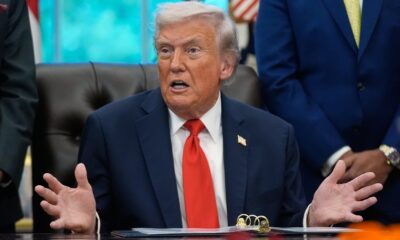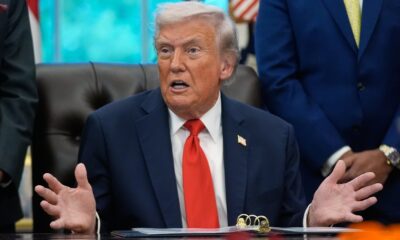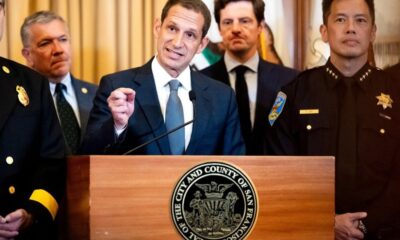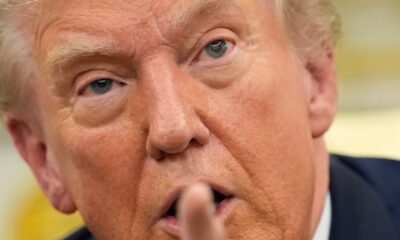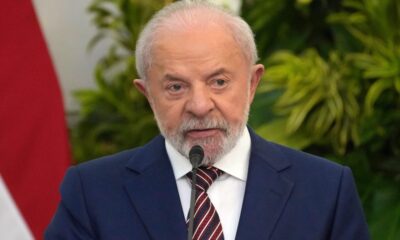Politics
China Stages Diplomatic Showcase, Trump Left in the Shadows
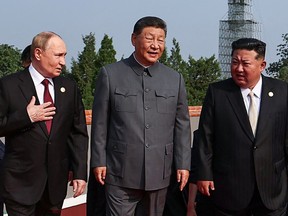
In a significant display of diplomatic power, China hosted a military parade on September 3, 2025, commemorating the 80th anniversary of Japan’s defeat in World War II. The event featured prominent guests such as Vladimir Putin and Kim Jong Un, implicitly contrasting their attendance with the solitary military showcase held by former President Donald Trump in June.
The contrast highlights a shift in global diplomatic dynamics. Historically, the phrase “only Nixon could go to China” suggested that only someone with staunch anti-communist credentials could engage with the Chinese government. This notion, prominent in the early 1970s, was rooted in the belief that opening diplomatic channels could prevent China from aligning with the Soviet Union. Today, however, China’s diplomatic reach appears far broader.
Historical Context and Current Implications
Wednesday’s parade not only marked a pivotal moment in history but also served as a reminder of the alliances formed during World War II. The United States, Soviet Union, and pre-Maoist China were allies against imperial Japan. The National World War II Museum in New Orleans emphasizes that the relevant dates of this conflict stretch from 1937 to 1945, beginning with the Sino-Japanese War. This highlights a different perspective on the war, especially compared to the European-centric view often held in Canada and other Western nations.
Fast forward to the present, and the diplomatic landscape has evolved dramatically. Following the Cold War, the primary challenge for Western nations has been integrating both Russia and China into a global order prioritizing democracy, human rights, and market-oriented trade. This effort has faced significant hurdles, especially as President Putin seeks to reassert Russia’s influence in the wake of the Soviet Union’s dissolution, which he termed the “greatest geopolitical tragedy of the 20th century.”
Since 2014, and more aggressively since 2022, Putin’s actions in Ukraine have raised questions about the future of international relations. The ongoing conflict poses a critical challenge for President Trump, who may need to adopt more robust strategies against Putin if he hopes to influence the situation. As Trump has threatened consequences for Russia, Putin has intensified his military actions, seemingly unfazed by Trump’s threats.
China and India’s Role in the Conflict
The recent Shanghai summit and military parade suggest that China and India, despite their potential influence over Russia, are not inclined to intervene to halt the war in Ukraine. Instead, both Xi and Indian Prime Minister Narendra Modi appear to accept the conflict as a necessary price for a world that allows them greater autonomy from Western interests.
Trump’s attempts to leverage tariffs against both China and India may have inadvertently reinforced this perspective. By imposing substantial taxes on American imports from India, he aimed to persuade New Delhi to halt its purchases of Russian oil. However, such strategies may backfire, as Modi’s public displays of camaraderie with Putin indicate a reluctance to alter India’s stance.
While Trump sought to isolate Russia diplomatically, the reality is that Putin’s recent engagements in Shanghai and Beijing—attended by leaders from India and North Korea—underscore a growing alignment among these nations that could challenge U.S. interests.
The implications of these developments raise critical questions not only about the future of the Ukraine conflict but also about the global balance of power. Can China and India effectively influence Russia to cease its aggression, and if they could, would they choose to do so?
The answers remain uncertain, but the recent events illustrate a clear trend: as the geopolitical landscape shifts, the traditional levers of diplomacy may no longer hold the same power they once did.
-

 World3 months ago
World3 months agoScientists Unearth Ancient Antarctic Ice to Unlock Climate Secrets
-

 Entertainment3 months ago
Entertainment3 months agoTrump and McCormick to Announce $70 Billion Energy Investments
-

 Lifestyle3 months ago
Lifestyle3 months agoTransLink Launches Food Truck Program to Boost Revenue in Vancouver
-

 Science3 months ago
Science3 months agoFour Astronauts Return to Earth After International Space Station Mission
-

 Technology2 months ago
Technology2 months agoApple Notes Enhances Functionality with Markdown Support in macOS 26
-

 Top Stories2 weeks ago
Top Stories2 weeks agoUrgent Update: Fatal Crash on Highway 99 Claims Life of Pitt Meadows Man
-

 Sports3 months ago
Sports3 months agoSearch Underway for Missing Hunter Amid Hokkaido Bear Emergency
-

 Politics3 months ago
Politics3 months agoUkrainian Tennis Star Elina Svitolina Faces Death Threats Online
-

 Technology3 months ago
Technology3 months agoFrosthaven Launches Early Access on July 31, 2025
-

 Politics3 months ago
Politics3 months agoCarney Engages First Nations Leaders at Development Law Summit
-

 Entertainment3 months ago
Entertainment3 months agoCalgary Theatre Troupe Revives Magic at Winnipeg Fringe Festival
-

 Politics2 weeks ago
Politics2 weeks agoShutdown Reflects Democratic Struggles Amid Economic Concerns

